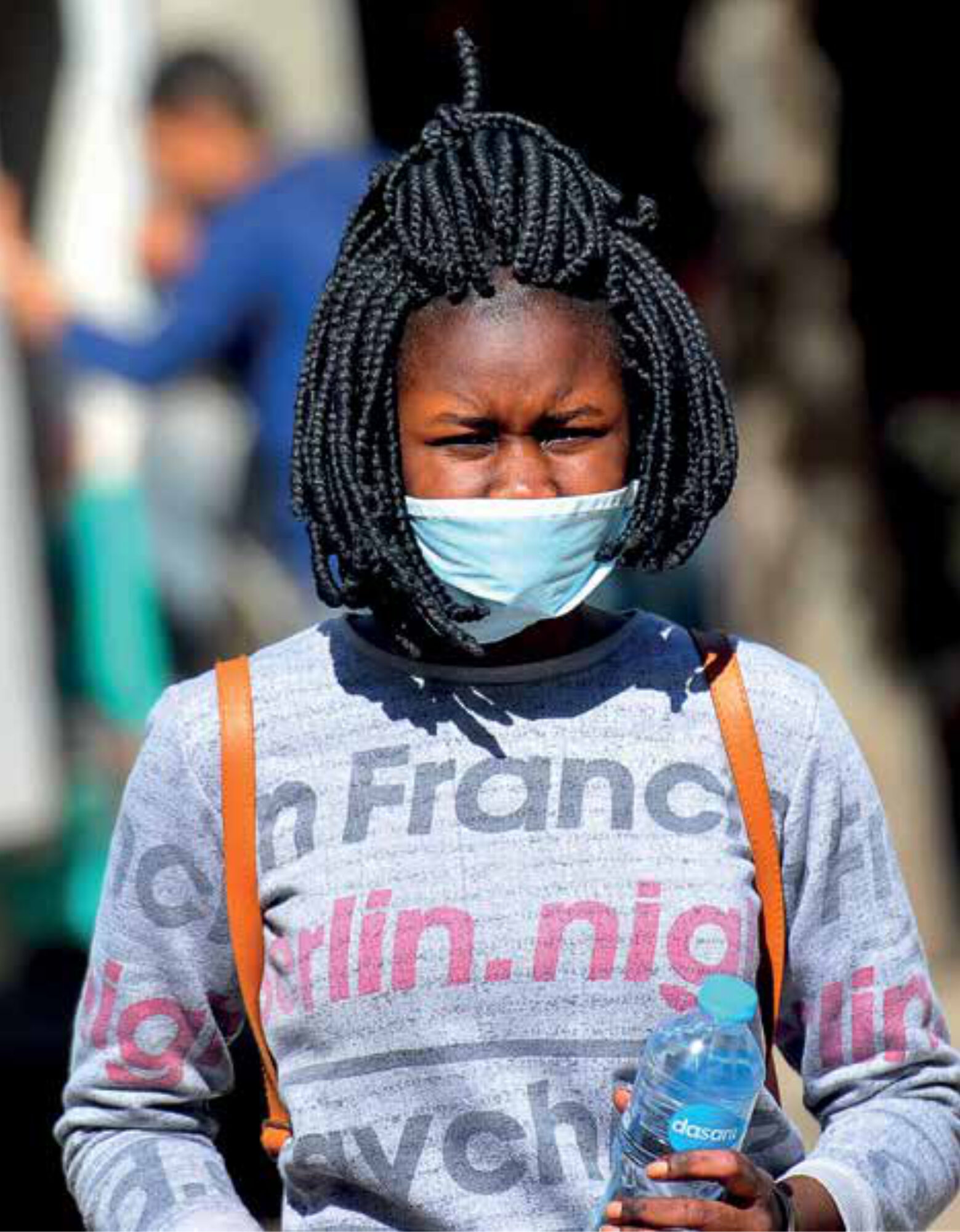Main content
The Covid-19 (corona virus disease, detected in 2019) pandemic is keeping a firm grip on the world and affects the health of those ill with Covid-19 as well as those with other illnesses; it overburdens health services and causes delays in diagnosis and treatment of other conditions. While there is universal fear of infection, this is especially evident among service providers and people accessing health facilities. Population-based screening programmes to detect breast, cervix and colon cancer have been suspended; the waiting lists for elective surgical procedures are becoming longer. In addition to the impact on health, severe damage to the economy is caused by lockdown measures affecting small and big businesses. Especially in low- and middle-income countries, lockdown and social distancing affect the informal sector and thereby people’s livelihoods, resulting in food shortages and malnutrition. Control efforts for various tropical diseases and vaccination programmes have been suspended. The overall morbidity and mortality caused by the pandemic is therefore not restricted to Covid-19. There is no specific treatment for Covid-19 infection, and the pandemic has sparked a flurry of research projects that focus on inhibiting the replication of the virus, on its effects on the human respiratory system and other organs, and on the immune response triggered by Covid-19.
In this paper, current insight into the management of Covid-19 infection as well as the main features of ongoing drug studies are discussed. Lastly, issues in publication including peer review are discussed.
Clinical syndrome
Covid-19 infection is caused by the SARS-CoV-2 virus; the name refers to the severe acute respiratory syndrome caused by a similar corona virus, SARS-CoV-1. The virus enters the body through person-to-person airborne transmission. There is no proven animal reservoir; in the Netherlands, the infection was detected in mink farms but was thought to originate from humans. The virus is spread in crowded conditions and mass gatherings: the celebration of carnival (province of North Brabant, the Netherlands), winter ski holidays (North Italy, Austria) and (international) football matches like the Champions League match between Atalanta Bergamo vs Valencia on February 19 with 40,000 Italian and Spanish supporters (with subsequent outbreaks in Italy and Spain) are thought to have contributed to major outbreaks in Europe.
The clinical picture is dominated by respiratory symptoms, with fever, shortness of breath, and cough. Fatigue is common and other non-respiratory symptoms include confusion and diarrhoea. Most infections are only mildly symptomatic and self-cure within days or weeks. Other patients require hospitalization and develop pneumonia with so-called ground glass opacities on a CT scan; oxygen administration is needed and other supportive care, including admission to intensive care units with intubation and artificial ventilation, often because of the adult respiratory disease syndrome (ARDS). Severe pneumonia and death occur in 4-5% of admitted patients in a setting with optimal care (Lancet, Covid-19 clinical research coalition, 25 April 2020). While in hospital, sudden deterioration may occur caused by thromboembolism in the major lung vessels and the brain, with poor outcome. Viral sepsis has been suggested among explanations causing damage to blood vessels; other organs may be affected as the virus spreads to other parts of the body. An overreaction of the immune system may occur with cytokine release storm (CSR) which may also contribute to organ damage. All this may contribute to development of acute renal failure, viral myocarditis, multi-organ failure and death.
Risk factors and diagnosis
Risk factors for a severe course of the disease are co-morbidities such as chronic heart disease, diabetes mellitus, underlying respiratory conditions such as COPD and asthma, malignancy and obesity. In addition, the risk for severe disease increases with advanced age >60 years. In contrast, young children are usually asymptomatic. The diagnosis is made by demonstrating the virus via PCR in a nasal and/or throat swab. Serological tests for IgM and IgG antibodies are currently continually being improved in terms of sensitivity and specificity; these tests only indicate past exposure and are not suitable yet for confirmation of the diagnosis in someone who is symptomatic. Currently, in populations in Europe not more than 5% of people tested have antibodies showing previous infection (asymptomatic or symptomatic); it is not clear whether these antibodies are fully protective and for how long.
Interventions
Currently there is no treatment with proven efficacy. A multitude of observational and randomised controlled trials (RCTs) are ongoing, that initially mainly focused on drugs that had been studied for SARS, MERS (Middle East respiratory syndrome) or Ebola disease, but that unfortunately were not developed further when these outbreaks lost their epidemiological importance. Some drugs are still experimental and have not been used or studied in humans, and therefore existing drugs (for whatever indication) that can be re-purposed for Covid-19, are clearly preferred. While most studies focus on mitigation of Covid-19 disease, other efforts focus on prophylaxis. The early drugs that are considered for potential benefit in Covid-19 are included in the Solidarity trial of the World Health Organization (WHO) in patients hospitalized for confirmed Covid-19. It has four arms:
- HIV protease inhibitors: lopinavir/ritonavir
- antimalarials: hydroxychloroquine and chloroquine
- antiviral (RNA polymerase inhibitor): remdesivir
- immunomodulatory agent: lopinavir/ritonavir with interferon ia
Other early major studies include the RECOVERY trial (randomised evaluation of Covid-19 therapy) in the United Kingdom in hospitalised patients, primarily studying the effect of hydroxychloroquine, lopinavir/ritonavir, azithromycin, dexamethasone vs no additional treatment. Patients are further randomized to receive tocilizumab (an interleukin-6 blocker) and convalescent plasma.
Antimalarial drugs
Recently published preliminary data on antimalarials are not encouraging. Hydroxy-chloroquine and chloroquine were among the first candidate drugs suggested. The effect of these antimalarials is thought to be a pH-mediated at the level of virus entry in the cell as well as disruption of viral replication.[1] A combination therapy with azithromycin was suggested to have a beneficial effect.[2] This publication was recently criticised and could not stand up to scrutiny. There is increasing evidence that these drugs are of no clinical benefit and severe cardiotoxicity has been reported, which seems aggravated by co-administration of azithromycin.[3] Prophylactic use of hydroxychloroquine after high-risk or moderate risk post exposure to Covid-19 did not prevent illness in a recent study.[4]
Antiviral drugs
Remdesivir is an antiviral drug (RNA polymerase inhibitor) that inhibits SARS-CoV-2 (that causes Covid-19), as well as SARS-COV-1 (that causes SARS) and MERS-CoV (that causes MERS) in animal models. In a recently published RCT, there was no clinical benefit although early treatment might shorten time to clinical improvement.[5] There is no evidence yet that remdesivir is beneficial in severe Covid-19 infection in a patient on the intensive care. The drug was recently registered by the European Medicines Agency (EMA). Lopinavir/ritonavir, an antiretroviral drug used in HIV/AIDS has so far failed to show a clinical benefit in early reports. In hospitalized adults with severe Covid-19 infection, no clinical benefit was found.[6] Combination treatment with interferon and ribavirin showed better alleviation of clinical symptoms as well as shortening of duration to negative nasal swab and hospital stay in mild to moderate Covid-19.[7] RCTs on other antiviral drugs against SARS-CoV-2, including favipiravir are ongoing as there are mixed reports about their in vitro and in vivo efficacy.[8]
Immune modulation
This is also a subject of study; the evidence on the use of corticosteroids is controversial. While the immunosuppressive effect may be beneficial, there is concern of prolonged viral shedding and secondary infections.[9,10] The timing of such intervention in the course of the disease may be crucial.
The excessive immune response in the cytokine release is characterized by high levels of cytokines such as interleukin (IL)-6. Tocilizumab is an IL-6 blocker that is used for example in rheumatoid arthritis; a small study in 22 patients recently published showed remarkable clinical improvement in Covid-19, and RCTs are eagerly being awaited.[11] Similarly, the effect of inhibition of IL-1 is being studied.
Other immune therapies include the use of immunoglobulins and re-convalescent plasma of patients who have recovered from Covid-19.
Alternative drugs
Ivermectin and nitazoxanide have shown anti-SARS-CoV-2 activity in vitro and are licensed for other conditions, and thus they can be studied directly in Covid-19.
Latest reports: in a webinar on 30 June 2020, the RECOVERY trial showed unpublished data indicating that in admitted patients who are on oxygen or ventilation, mortality was reduced by 1/5 and 1/3, respectively, after administration of low dose (6 mg) dexamethasone for 10 days. In similar patients, hydroxychloroquine or lopinavir/ritonavir did not show an effect on mortality. It should be noted that the latter two drugs were studied for their antiviral effect, whereas dexamethasone in general influences inflammatory damage to the lungs and is already used in severe ARDS caused by other conditions.
Controversy
The SARS-CoV-2 virus uses receptors to bind to a respiratory cell before being able to enter the cell and replicate. The angiotensin-converting enzyme (ACE) 2 receptor is among these. Patients with high blood pressure have higher levels of these receptors and treatment for hypertension with an ACE inhibitor or angiotensin receptor blocker (ARB) such as losartan may increase expression of the receptor. It has therefore been speculated that these patients are at increased risk of severe Covid-19. However, there is also the possibility that losartan treatment may be beneficial by blocking the binding of the virus. Currently, there is no conclusive evidence and patients on losartan treatment are advised not to discontinue their treatment.
Publication stress
Every week a plethora of reports are published in scientific journals including the authoritative The Lancet and the New England Journal of Medicine (NEJM). While publication, often after expedited peer-review, of any useful result in Covid-19 is clearly important, mistakes have been made. Both The Lancet and NEJM have retracted papers that were criticized for methodological flaws or poor quality of data after publication.[12-16] The above mentioned work on hydroxychloroquine by the French virologist Didier Raoult, who is held in high esteem in France, particularly in his hometown Marseille, was criticised as many of his publications appeared in journals in which he or his co-workers were among the members of the editorial board. (The Economist, June 13th, 2020; NRC Handelsblad, June 13th, 2020).
Conclusion
Covid-19 causes severe and fatal disease, be it in a minority of cases. Currently there is no drug treatment that has been proved effective and safe, in prophylaxis or in mitigation of clinical disease. Management is therefore largely supportive with intervention by administration of potentially effective drugs based on clinical experience and evolving evidence in the scientific literature.
Note of the author: every week new studies are published that change insight on the management of Covid-19; this paper summarized information available up to 30 June 2020.
References
- Sturrock BR, Chevassut TJ. Chloroquine and COVID-19: a potential game changer? Clin Med (Lond). 2020 Apr 17;20(3):278-81. Online ahead of print
- Gautret P, Lagier JC, Parola P, et al. Clinical and microbiological effect of a combination of hydroxychloroquine and azithromycin in 80 COVID-19 patients with at least a six-day follow up: A pilot observational study. Travel Med Infectious Dis. 2020 Mar-Apr;34:101663. Epub 2020 Apr 11
- Juurlink DN. Safety considerations with chloroquine, hydroxychloroquine and azithromycin in the management of SARS-CoV-2 infection. CMAJ. 2020 Apr 27;192(17): E450-E3. Epub 2020 Apr 8
- Boulware DR, Pullen MF, Bangdiwala AS, et al. A randomized trial of hydroxychloroquine as postexposure prophylaxis for Covid-19. N Engl J Med. 2020 Jun 3;NEJMoa2016638. Online ahead of print
- Wang Y, Zhang D, Du G, et al. Remdesivir in adults with severe COVID-19: a randomised, double-blind, placebo-controlled, multicentre trial. Lancet. 2020 May 16;395(10236):1569-78. Epub 2020 Apr 29
- Cao B, Zhang D, Wang C. A trial of lopinavir-ritonavir in Covid-19: reply. N Engl J Med. 2020 May 21;382(21):e68. Epub 2020 May 5
- Hung IF, Lung KC, Tso EY, et al. Triple combination of interferon beta-1b, lopinavir-ritonavir, and ribavirin in the treatment of patients admitted to hospital with COVID-19: an open-label, randomised, phase 2 trial. Lancet. 2020 May 30;395(10238):1695-704. Epub 2020 May 10
- Coomes EA, Haghbayan H. Favipiravir, an antiviral for COVID-19? J Antimicrob Chemother. 2020 Jul 1;75(7):2013-4. Epub 2020 May 18
- So C, Ro S, Murakami M, et al. High-dose, short-term corticosteroids for ARDS caused by COVID-19: a case series. Respirol Case Rep. 2020 Jun 4;8(6):e00596. Epub 2020 Jun 10
- Fadel R, Morrison AR, Vahia A, et al. Early short course corticosteroids in hospitalized patients with COVID-19. Clin Infect Dis. 2020 May 19;ciaa601. Online ahead of print
- Xu X, Han M, Li T, et al. Effective treatment of severe COVID-19 patients with tocilizumab. Proc Natl Acad Sci U S A. 2020 May 19;117(20):10970-5. Epub 2020 Apr 29
- Mehra MR, Desai SS, Kuy S, et al. Cardiovascular disease, drug therapy, and mortality in Covid-19. N Engl J Med. 2020 Jun 18;382(25):e102. Epub 2020 May I
- Mehra MR, Desai SS, Kuy S, et al. Retraction: cardiovascular disease, drug therapy, and mortality in Covid-19. N Engl J Med. 2020 Jun 25;382(26):2582. I: 10.1056/NEJMoa2007621. Epub 2020 Jun 4
- Rubin EJ. Expression of concern: Mehra MR et al. Cardiovascular disease, drug therapy, and mortality in Covid-19. N Engl J Med. 2020 Jun 18;382(25):2464. DOI: 10.1056/NEJMoa2007621. Epub 2020 Jun 2
- Solomon MD, McNulty EJ, Rana JS, et al. The Covid-19 pandemic and the incidence of acute myocardial infarction. N Engl J Med. 2020 May 19. Online ahead of print
- Mehra MR, Desai SS, Ruschitzka F, et al. RETRACTED: hydroxychloroquine or chloroquine with or without a macrolide for treatment of COVID-19: a multinational registry analysis. Lancet. 2020 May 22;S0140-6736(20)31180-6. Online ahead of print



















































